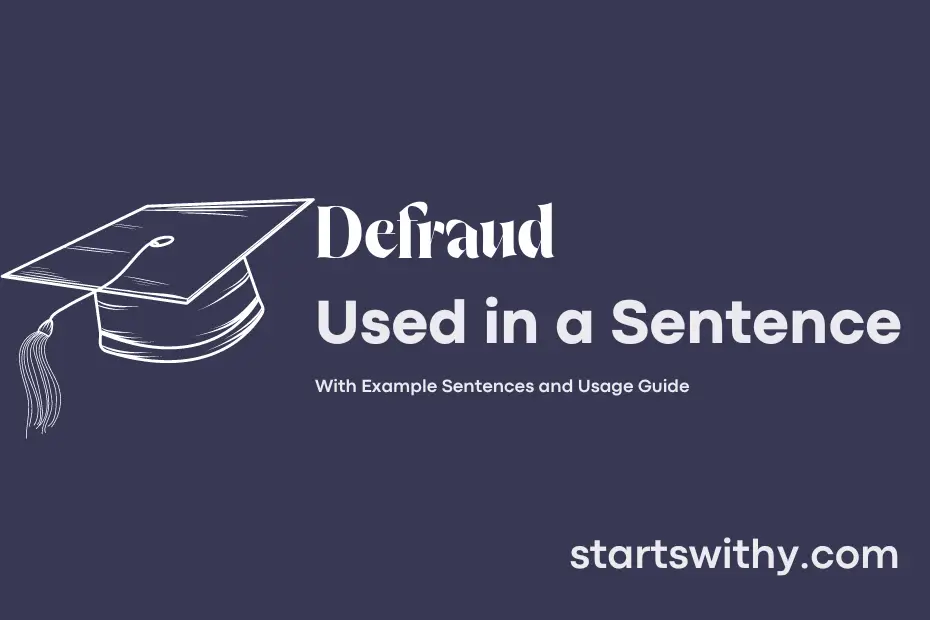Have you ever wondered what it means to “defraud” someone? “Defraud” is a verb that refers to the act of deceiving or cheating someone in order to gain money or other advantages illegally.
This can include schemes, tricks, or dishonest practices used to persuade someone to give up something of value. Defrauding someone typically involves dishonesty, false representation, or withholding necessary information to manipulate a situation for personal gain.
7 Examples Of Defraud Used In a Sentence For Kids
- **Someone tried to defraud me by selling fake toys.
- It is wrong to defraud others by cheating in games.**
- The thief wanted to defraud the old man by stealing his money.
- I will not defraud my friends by lying to them.
- We should always be honest and not defraud anyone.
- It is important to report anyone who tries to defraud you.
- Let’s make a promise to never defraud others and always be truthful.**
14 Sentences with Defraud Examples
- Be cautious of online shopping websites that may defraud you by selling counterfeit products.
- Some fake universities defraud students by offering degrees that are not recognized by the government.
- Avoid giving out your personal information to avoid falling prey to phishing scams that aim to defraud you.
- Always double-check the legitimacy of job offers to prevent companies that aim to defraud job seekers.
- Don’t get lured into investment schemes that promise high returns but are designed to defraud unsuspecting investors.
- Verify the credibility of charity organizations before donating to prevent falling victim to those who aim to defraud donors.
- Be aware of schemes that offer scholarships but actually aim to defraud students of their money.
- Some travel agencies may defraud customers by charging hidden fees or providing substandard services.
- Stay cautious of individuals or companies offering fake internship opportunities that aim to defraud students.
- Avoid engaging with individuals who claim to provide leaked exam papers as they may be attempting to defraud you.
- Never share your bank details with unknown sources to prevent falling victim to phishing scams that aim to defraud you.
- Always verify the authenticity of online platforms before making payments to avoid being defrauded.
- Some landlords may try to defraud students by charging excessive security deposits or asking for advance rent.
- Stay alert and report any suspicious activity to prevent fraudsters from trying to defraud you.
How To Use Defraud in Sentences?
Defraud means to deceive someone in order to obtain money or something valuable through dishonest means. To use defraud in a sentence, you can follow these steps:
-
Begin by identifying a situation where someone is being dishonest in order to obtain something valuable.
-
Once you have identified the scenario, insert the word defraud into your sentence in a way that conveys the deception occurring.
For example, you could say: “The company employees conspired to defraud their customers by charging them for services they did not receive.”
By using defraud in this sentence, you are clearly indicating that the company employees were deceiving their customers in order to make money through dishonest means.
Remember, using defraud in a sentence is all about identifying situations where someone is being deceptive in order to obtain something valuable. By incorporating this word into your sentence, you can clearly express the dishonesty and deception taking place.
Conclusion
In conclusion, the examples of sentences with “defraud” illustrate various instances where individuals or entities deceive others for personal gain. These sentences show the different ways in which fraud can occur, such as deceptive schemes, false representations, and financial manipulation. It is essential to be cautious and vigilant to avoid falling victim to fraud, whether in business transactions, online interactions, or any other aspect of life. By being aware of the signs of fraudulent behavior and taking steps to protect oneself, individuals can reduce the risk of being defrauded and safeguard their assets and personal information.



